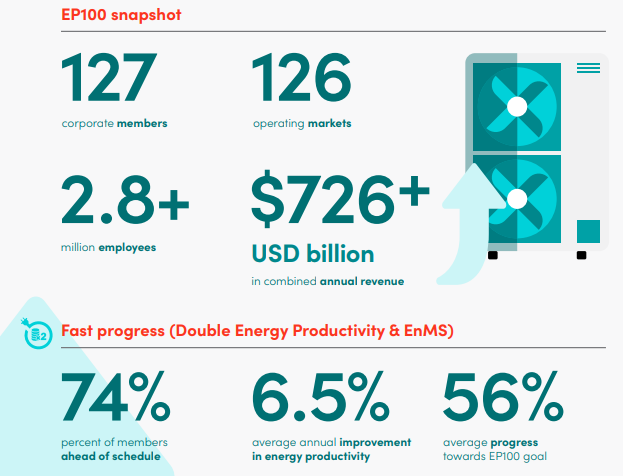Global Push for Energy Efficiency Critical for Net Zero by 2050: EP100 Report
IEA suggests that energy efficiency will add as much as $18 trillion to global GDP by 2035
March 7, 2022
Follow Mercom India on WhatsApp for exclusive updates on clean energy news and insights
The EP100, a global initiative led by the international non-profit Climate Group, recently published a ‘Progress and Insights’ report highlighting the importance of enhanced energy efficiency to achieve the net-zero targets by 2050.
EP100 (Energy Productivity) is a global corporate energy efficiency initiative bringing together 127 corporates across 126 operating markets from all over the world, committed to measuring and reporting on efficiency improvements.
With corporates worldwide setting net-zero targets, the EP100 report highlights how most lack a detailed action plan to achieve them. It lays out the framework of a dedicated and time-bound energy efficiency pathway to reach these set targets through participation in its initiative.
To become a member of the EP100 group, companies are required to commit to double their economic output from every unit of energy consumed globally within at least 25 years, from a fixed baseline year no longer than 2005. The company must also commit to implementing an energy management system globally across its operations within at least ten years. It will be required to commit to owning only net-zero carbon assets by 2030. The companies should also choose a relevant energy productivity metric to track and reports its progress.
Energy productivity is calculated as the ratio of economic output to energy consumption. By implementing efficiency measures, EP100 members improve their energy productivity and earn more profits – while reducing greenhouse gas emissions.
Smarter energy use helps to reduce primary energy demand and accelerate the uptake of more efficient technologies and practices. Research by the IEA suggests energy efficiency will add as much as $18 trillion to global GDP by 2035 and an estimated 40% reduction in energy-related emissions by 2040.
The EP100 initiative has managed to avoid 340 million metric tons of carbon dioxide and save 974 TWh of energy to date.


The report highlights 74% of its members are already ahead of schedule to reach their EP100 targets. The major factors driving the member companies have been the net-zero transition targets and the financial savings, which amount to $1.2 billion to date. Members have realized several financial benefits by increasing energy efficiency, including reduced utility costs, increased productivity, and complying with energy-related regulations.
The top barriers in achieving the energy efficiency targets, as per the report, were the high upfront costs of installing higher efficiency or energy management technologies, the lack of policy incentives and support, and in certain regions, the lack of technology itself.
India-based Godrej & Boyce, the flagship company of the Godrej Group, is one of the EP100 members who joined the group in 2020. Since then, the company has been implementing energy efficiency measures across its manufacturing plants by adopting more efficient technologies and phasing out inefficient processes.
The company has also constructed India’s first net-zero carbon building according to the Indian Green Building Council’s (IGBC) rating system, with an energy-efficient, thermally insulated envelope with extensive daylight and an energy management system.
The report highlights the increase in energy use across corporates despite the pandemic-induced shutdowns, revealing the ineffectiveness of the energy management systems in place. Energy efficiency is seen as a way to improve work environments and act as a source of job creation alongside helping companies achieve their net-zero targets.
